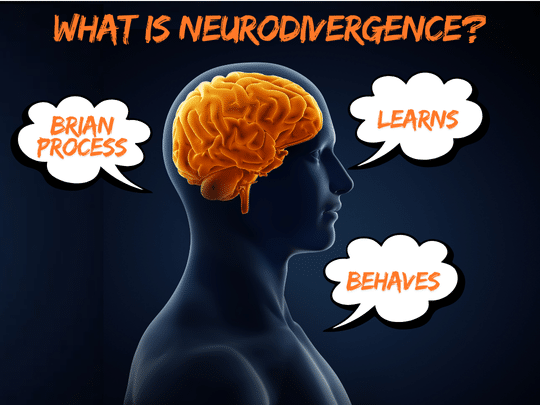Introduction
Does living with depression mean you’re neurodivergent? This question is making a lot of discussion among mental health specialists, advocates, and people living with mood disorders. The answer is essential as it disturbs how people get their identity, deal with stigma, and attach to the neurodiversity movement. Conditions like Autism and ADHD are recognized as kinds of neurodivergence. Still, the role of depression is not as clear. Some believe depression changes how the brain works in techniques that may fit under neurodivergent involvements. In contrast, others get it as a separate mental health condition. In this blog, we’ll look at the meanings, similarities, and professional views to answer the question: Is depression neurodivergent?
1: What Is Neurodivergence?
 Neurodivergence means a person’s brain works in a different way from “normal.” People who are not neurodivergent are called neurotypical. Sociologist Judy Singer presented the idea of neurodivergence and starting the neurodiversity movement. This movement assisted people in accepting these changes not just as “complications” but as natural differences of the human brain. Neurodivergence encompasses a wide range of conditions, including Autism Spectrum Disorder (ASD), Attention Deficit Hyperactivity Disorder (ADHD), dyslexia, and other cognitive and developmental differences.
Neurodivergence means a person’s brain works in a different way from “normal.” People who are not neurodivergent are called neurotypical. Sociologist Judy Singer presented the idea of neurodivergence and starting the neurodiversity movement. This movement assisted people in accepting these changes not just as “complications” but as natural differences of the human brain. Neurodivergence encompasses a wide range of conditions, including Autism Spectrum Disorder (ASD), Attention Deficit Hyperactivity Disorder (ADHD), dyslexia, and other cognitive and developmental differences.
Common instances of neurodivergence include:
- Autism spectrum disorder (ASD)
- Attention-Deficit/Hyperactivity Disorder (ADHD)
- Dyslexia
- Dyspraxia
- Tourette syndrome
- Dyscalculia
Neurodivergent people may face trials with learning, concentration, or communication, but they, too, have distinct strengths like creativity, new ideas, empathy, and exclusive ways of solving complications, which add value to society.
2: Depression Overview
 Depression is a mental health condition clarified in the DSM-5 (a guide for mental disorders). It means having strong and lasting feelings of unhappiness, hollowness, or losing interest in everyday life. Common symbols are:
Depression is a mental health condition clarified in the DSM-5 (a guide for mental disorders). It means having strong and lasting feelings of unhappiness, hollowness, or losing interest in everyday life. Common symbols are:
- Feeling sad or desperate most of the time
- Losing interest in things you enjoyed one time
- Variations in eating or sleeping habits
- Feeling very exhausted or low on energy
- Trouble concentrating or making selections
Depression may happen for a short period or last for a long time. With the correct treatment, medicine, healthy habits, and support, various people feel well and recover.
3: Depression through a Neurodivergent Lens
Some people believe depression can be seen as a form of neurodivergence as it changes how the brain works and how a person sees their regular life. Depressed people frequently experience slow thinking, trouble concentrating, memory problems, and feeling cut off from others. These struggles are somewhat like the trials faced by people who are previously called neurodivergent, such as those with ADHD or Autism. For this reason, some people with depression choose to identify as part of the neurodivergent community. In this way, they feel their changes are not a disease but a part of them. The discussion displays how people view themselves and how medicine describes conditions does not always match.
4: Similarities between Depression & Neurodivergence
There are clear overlaps between depression and neurodivergence, which makes them look similar in some ways: Thinking problems: Both can bring concern with attention, memory, making selections, and solving complications. Brain changes: In depression, ADHD, and Autism, the brain chemicals work in a strange way, disturbing mood and thoughts. Social struggles: People often face loneliness, refusal, and a lack of understanding. Happening together:
- People with Autism are four times more likely to also have depression.
- Around one in three people with ADHD also face depression.
- Those with learning disabilities have much greater probabilities of depression.
This displays that depression shares brain patterns and life struggles with other neurodivergent situations.
5: Why the Debate Matters
The debate about whether depression is neurodivergent is essential. If people saw depression this way, it could lower stigma by displaying the brain works in a different way, not that it is “broken.” It would also help people with depression feel included below the neurodiversity umbrella, like those with Autism or ADHD. This view could lead to more personal and caring action. But doctors still see depression merely as a mood disorder.
6: Therapy & Treatment Options
No matter if depression is perceived as neurodivergent or not, getting the exact help is essential. There are many worthwhile ways to feel well. Cognitive Behavioral Therapy teaches how someone can notice and change their negative views. Mindfulness therapy helps people stay calm, center on the present, and decrease continuous worries. Group therapy lets people share their feelings with others, get support, and feel less isolated. But some medicines can be used to fix brain chemicals and improve mooSupport groups and neurodivergence-friendly therapy offer encouragement, self-acceptance, and a sense of belonging. It’s not a weakness to get support—it’s a brave step toward healing and taking back control of your life.

7: Conclusion
So, is depression considered neurodivergent? Not officially. Depression is a mood disorder. It has lots of things in common with neurodivergence, like changes in brain chemistry, neurotransmitters, stigma, remission, co-occurrence, and therapy for depression. To look at depression in this way can help people be more understanding, decrease shame, and support fair treatment. The bottom line: Depression is not officially known as neurodivergence, but some people consider depression as neurodivergence. If you or somebody you care about is struggling, please look for support and healing, then brighter days will come soon.
Frequently Asked Questions
1. Is depression officially called neurodivergent?
No. Doctors call it a mood disorder, not neurodivergence.
2. Why do some people think depression is neurodivergent?
It changes how the brain works, how a person thinks, and how they live, which is a bit like conditions such as ADHD or Autism.
3. Can a person with depression say they are neurodivergent?
Yes. Some people decide to call themselves that for support and belonging, even if doctors don’t use the term.
4. Can depression be lifelong like neurodivergence?
Depression can come and go in episodes. Some people may have it for a lengthy period, but neurodivergence is lifelong.
5. Is it any difference between neurodiversity and mental health?
Neurodiversity means people’s brains work in diverse ways, like with Autism, ADHD, or Dyslexia. Mental health is about how you feel, think, and cope with life, such as with depression or nervousness.
6. Is there a link between depression and brain chemistry?
Yes. Depression happens when brain chemicals like serotonin, dopamine, and norepinephrine change. These chemicals are too connected to other brain differences.
7. Can someone be both neurodivergent and have depression?
Yes. People with Autism, ADHD, or learning problems also deal with depression.
8. Should I seek help if I think I have depression?
Yes. Depression is actual but fixable. Getting assistance from an expert can help you recover how you feel.


Recent Comments